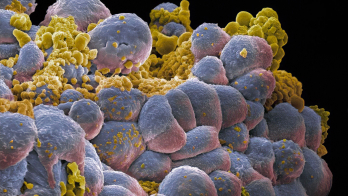Watch this webinar now, sponsored by Fermilab
By clicking the “Watch now” button you will be taken to our third-party webinar provider in order to register your details.
Want to learn more on this subject?

Future scientific breakthroughs in high-energy physics will require unprecedented levels of international engagement, building on the successful model of the Large Hadron Collider at CERN. Joe Lykken, Fermilab deputy director for research, will describe how Fermilab is moving forward rapidly with CERN and other international partners to realise this vision.
The questions under scrutiny range from the nature of the Higgs field to the question of whether neutrinos play a role in the matter-antimatter asymmetry observed in the universe. PIP-II, an upgrade to the Fermilab accelerator complex that includes a leading-edge superconducting linear accelerator, is already under construction, with major “in-kind” contributions and expertise from partners in India, Italy, the UK, France and Poland. PIP-II will enable the world’s most intense beam of neutrinos for the Deep Underground Neutrino Experiment (DUNE), which will deploy 70,000 tonnes of liquid argon detectors in a deep underground site 1300 km from Fermilab. DUNE was formulated as an international project from the start, and now includes more than a thousand collaborators from 30 countries. Two large prototype detectors for DUNE have been successfully constructed and tested at the CERN Neutrino Platform. DUNE will have remarkable capabilities to determine how the properties of neutrinos have shaped our universe. At the same time, Fermilab has been developing and building next-generation superconducting magnets that will be deployed in the HL-LHC accelerator at CERN, and is the US lead for ambitious upgrades to the CMS experiment for the HL-LHC era. These technological capabilities will also make Fermilab an important partner for the proposed Future Circular Collider.
Want to learn more on this subject?
 Joseph Lykken is Fermilab’s deputy director of research and leads the Fermilab Quantum Institute. A distinguished scientist at the laboratory, Lykken was a former member of the Theory Department, researching string theory and phenomenology, and is a member of the CMS experiment on the Large Hadron Collider at CERN. He received his PhD from the Massachusetts Institute of Technology and has previously worked for the Santa Cruz Institute for Particle Physics and the University of Chicago. Lykken began his tenure at Fermilab in 1989. He is a former member of the High Energy Physics Advisory Panel, which advises both the Department of Energy and the National Science Foundation, and served on the Particle Physics Project Prioritization Panel, developing a road map for the next 20 years of US particle physics. Lykken is a fellow of the American Physical Society and of the American Association for the Advancement of Science.
Joseph Lykken is Fermilab’s deputy director of research and leads the Fermilab Quantum Institute. A distinguished scientist at the laboratory, Lykken was a former member of the Theory Department, researching string theory and phenomenology, and is a member of the CMS experiment on the Large Hadron Collider at CERN. He received his PhD from the Massachusetts Institute of Technology and has previously worked for the Santa Cruz Institute for Particle Physics and the University of Chicago. Lykken began his tenure at Fermilab in 1989. He is a former member of the High Energy Physics Advisory Panel, which advises both the Department of Energy and the National Science Foundation, and served on the Particle Physics Project Prioritization Panel, developing a road map for the next 20 years of US particle physics. Lykken is a fellow of the American Physical Society and of the American Association for the Advancement of Science.











